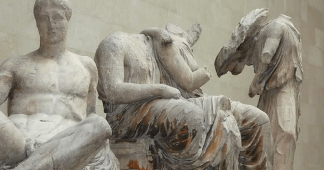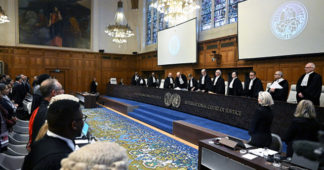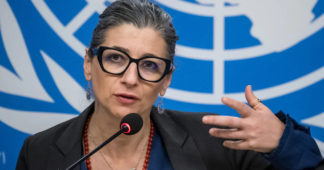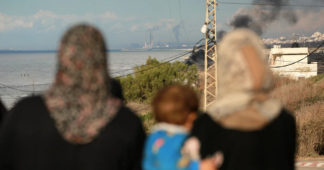William Mallinson*
Athens, 26 October 2025
Introduction
In 1948, the United Nations defined genocide as any of five ‘acts committed with intent to destroy, in whole or in part, a national, ethnical, racial or religious group’. These five acts were: killing members of the group, causing them serious bodily or mental harm, imposing living conditions intended to destroy the group, preventing births, and forcibly transferring children out of the group. There was no mention of culture, although I daresay that it was included by default, since the five acts surely imply its destruction.
Before offering a mental underpinning and approach to our topic, I quote my father a few years ago: ‘The inhuman race comprises some of the most evil and violent creatures in the world. There are a few others, such as, for example, sharks, but for thousands of years they have enjoyed killing people, many completely innocent, in their millions. And it’s still going on! I sometimes wish that I had been born a monkey, spending my days in the forest, looking for fruit and nuts. But then I thought how long would it be before my forest was cut down to make paper for advertising. So I gave up the idea!’
Approach
To approach the topic of cultural genocide dispassionately, one needs to avoid international relations theories and models, and adopt a pure and even pedantic historical method. I quote A. J. P. Taylor: ‘A historian must not hesitate even if his books lend aid and comfort to the Queen’s enemies […], or even to the common enemies of mankind.’ Before we weigh in with our topic, herewith some reminders of human behaviour, bearing in mind that in the darkest and dustiest corners of the human psyche lurk such unfortunate traits as greed, active racism, cowardice, and even sheer barbarity. So it is with states and empires, most of which have their fair share of skeletons in the cupboard which, when opened, reveal such nasty events as the destruction of Milos (Athens), blinding of the Bulgars (Eastern Roman Empire), the murder of Irish priests, woman and children at Wexford and Drogheda (England), the Amritsar massacre (Britain), the genocide of Armenians and Greeks (Ottoman Empire), the genocide of the Amerindians and the My Lai massacre (USA), the shooting of unarmed Polish prisoners (Soviet Union), the genocide of gypsies and Hebrews (Germany), the bombing of Dresden (the US by day, Britain by night), the genocide of Serbs (Croatia), the genocide of Cambodians (Cambodia), and the butchering of Palestinians at Shatah, Sabrila and elsewhere (Israel), and, as I write, in Gaza, where the Israeli military has murdered around 20,000 children. These, and many more, bear testimony to the dark side of Man’s behaviour towards Man, and how eminently uncivilised a species we still are, whatever smart clothes we wear, technological gadgetry we use, and clever theories we expound. When it comes to the crunch, we are simply clothed animals. Our ‘civilised’ technology has meant a greater propensity to kill than hitherto: in the Great War a mere ten million died, while the figure was fivefold in the last world war. Moreover, most who died in the latter were civilians, in contrast to the former.
As Lin Yutang wrote, putting human affairs into exact formulae shows a lack of sense of humour and therefore a lack of wisdom, while Man’s love for definitions is a step towards ignorance. The more he defined, aiming at an impossible logical perfection, the more ignorant he became. So it is with much post-Sixties international relations theory , but especially with geopolitics, a ‘primitive form of IR theory’, as Christopher Hill calls it. Geopolitics as a modern label is closely associated with the obsession of big powers to gain yet more power, through the control of resources. Despite its close association with the imperialist-minded Mackinder, and Nazi advisor Haushofer, it was Kissinger, of all people, who helped to slide the term back into current international relations terminology, by using it as a synonym for balance-of-power politics. The term is often used by politicians, who sometimes ignorantly interchange it with the term ‘geostrategy’. With the increasingly desperate struggle for the world’s resources, oil and gas pipelines almost become geographical maps. Old style borders, encompassing culturally and homogenous groups of people, become less relevant in the eyes of the geopolitician. As Hill writes, the random way in which frontiers are superimposed on the world means that states vary enormously in size, mineral wealth, access to the sea, vulnerability, and cohesiveness. A look at a map of the Middle East is enough to show how cynically Britain and France carved up much of the area following the Sykes-Picot deal, to suit their geopolitical lusts. The medium and long-term results have been tension in the area ever since then. The very foundation of the modern state of Greece was based on a compromise between the big powers as much as on love of Greek freedom, as we shall see later. As for Cyprus, Britain acquired it for simple geopolitical reasons. It is important to understand the background of the Turkish invasion which led to cultural genocide, before we tackle the latter head on.
The Invasion
The Turkish invasion, and therefore the impending cultural genocide, had been on the cards since the early Sixties, when Turkey was eventually able to find a pretext, albeit somewhat specious, to land troops on the island on 20 July 1974. Broadly speaking, we can be confident that the junta ruling in Athens, or at least leading elements of it, planned to depose Makarios and declare union with Greece. When the coup against Makarios occurred on 15 July, Turkey was therefore able, in the absence of British support, to land some forces on the island, citing the Treaty of Guarantee. They had an initial excuse, since Britain took French leave of its responsibilities, cocking a snoot at a treaty which it had itself signed. This Foreign and Commonwealth Office (FCO) quote says it all: ‘I would not risk British troops in such a situation unless it was clear that we would have the wholehearted backing of the United States’. Although the US had no legal locus standi in Cypriot affairs, the British Foreign Minister, Callaghan, and the Foreign and Commonwealth Office were beholden to Henry Kissinger.
After the first Turkish landings on 19 July, four days later, Glafkos Clerides temporarily assumed President Makarios’ duties, pending the latter’s return. Constitutional order was therefore restored, and Turkey had no legal reason to keep its troops in Cyprus. But knowing that she had a blank cheque from the US, she continued to advance in defiance of a UN Security Council resolution of 22 July, and during the frenetic negotiations that followed. Kissinger’s express procrastination in not immediately continuing to recognise Makarios after the 15 July coup speaks volumes. It clearly egged on Turkey.
As a result of Kissinger’s stalling tactics, the Turkish armed forces were able to continue their advance with impunity after the so-called ceasefire, agreed to take effect on 22 July.
Yet High Commissioner Olver reported that the Turkish Cypriots were in fact in no danger and that Turkey had no pretext for military intervention. On 18 July, he reported: ‘I have no (no) evidence of any immediate threat to the Turkish Cypriot community. There have been no attacks on the community during the past few days. The Turkish Cypriot Minister of Defence, Mr Orek confirmed to a member of my staff this morning that the Greek Cypriot Community, and in particular the National Guard, had been behaving with admirable caution: there had been a few minor casualties through bullets straying inadvertently across the Green Line, but in general the Turkish Cypriot Community had no cause for complaint in this respect.’ Thus Turkey’s espoused reasons for invading, namely to protect Turkish Cypriots (and to restore constitutional order), held no water.
Lying Diplomats
The parliamentary committee set up to enquire into the debâcle stated damningly in its report: ‘Britain had a right to intervene, she had the moral obligation to intervene, she had the military capacity to intervene. She did not intervene for reasons which the Government refuses to give.’ The following explains.
On 19 February 1976, Callaghan appeared before the Select Committee on Cyprus, that was to produce a report that embarrassed the FCO. He was accompanied by Alan Goodison, Head of Southern European Department, Derrick Burden, Head of Claims Department and John Freeland, Second Legal Adviser. We have seen how Callaghan and the FCO had had some indication that the Turkish armed forces were planning to invade Cyprus. What we have seen now needs to be compared with Callaghan’s and his ‘minders’ answers:
Mr. Rees-Davies: […] That being so, Ecevit having left London and gone back, there was in fact the first Turkish invasion which took place on the 20th July at that time of what were described in that communiqué of yours as abortive discussions with the Turkish representatives. That having obtained, at least you recognized, did you not, that there was to be an immediate invasion by the Turks into at least northern Cyprus at that time and that that was imminent?
Mr. Callaghan: No.
[…]
Mr. Rees-Davies: When you had the first Geneva Conference and communiqués were signed on the 30th July, at that time there was no indication that the Turks were withdrawing because reports were still coming through that they were increasing their hold in Northern Cyprus; that is right, is it not?
Mr. Goodison: It is true that immediately after the signature of the Geneva Declaration the Turks did move forward a little, but the substance of the Declaration was that they were going to stop, and it involved the delineation of the cease-fire lines which was to proceed between the two conferences. We expected that the lines would become stabilised after the first Geneva Conference.
Mr. Rees-Davies: That is right. You expected it but, in fact, events did not turn out that way. They still continued to indicate that there was a real danger of further advance, did they not?
Mr. Callaghan: No, I do not think that was indicated at all.
A few days later, on 26 February, the FCO compounded the lie in a telegram to Nicosia:
You may as necessary deny that HMG had any advance intelligence about the coup or the invasion and say that I denied this to the Select Committee.
Apart from the JIC report of 19 July above, the clearest indication that Callaghan and his officials chose to deceive the Committee is clearly demonstrated by the content of a ‘Top Secret’ letter to him of 10 August 1974, at the height of the second Geneva conference, from Air Vice Marshall Francis Mellersh, Assistant Chief of Defence Staff, who was in Geneva:
‘MILITARY ASPECTS OF THE PRESENT SITUATION
Likely Turkish Plans
1. The Turkish army is looking for an excuse to continue operations. Their next likely objective is to increase the size of their area to take in the entire North-East of Cyprus, bounded by a line from five miles east of Morphou, through the southern suburbs of Nicosia and along the old Famagusta road to Famagusta. I consider that to achieve this they would launch ground attack from their present position in the West and in Nicosia, combined with a parachute landing by two battalions in the Chatos enclave and possibly a beach landing in the northern part of Famagusta Bay. At the same time they would mount an armoured thrust Eastwards from the Eastern positions to link up with Chatos. A landing in Morphou Bay is considered unlikely at this stage. […]’
The same day Mellersh sent a ‘flash’ telegram to the Vice-Chief of the Defence Staff, via the British Mission to the UN in Geneva:
‘Foreign Secretary is most concerned at hard line attitude being adopted by Turkish delegation at Geneva and the strong indications that they may soon attempt a major break out from the area at present under their control. MOD reps have been asked to offer advice in general terms on the likely form a break out would take and what UNFICYP suitably reinforced could do by interposing itself and making it quite clear to the Turks that they would have to take on a UN force in achieving their objectives. The force would have to be large enough and so armed as to give good account of itself, but I have emphasized that deterrence is all we could hope for and that any question of holding the Turks is out of the question with the estimated Turkish force levels and in the face of Turkish air [sic]’. […]
Given the dirty side of national and international politics, it is not difficult to explain Callaghan and the FCO’s ethical lapse. First, during the Turkish invasion, which took place over a period of one month, Callaghan was simply slowly bludgeoned into toeing the Kissinger line, namely not to actually seek to take action against the Greek junta and the putschists in Cyprus as per the Treaty of Guarantee, then not to take action against Turkey. The independence that Britain had begun to demonstrate vis-à-vis the US, and its increasing co-operation with and within the EEC had evaporated when the mildly Gaullist Prime Minister, Edward Heath (the only British Prime Minister to visit Cyprus, in the face of Turkish protests, into the bargain) had lost the elections in Spring 1974. If Callaghan had not lied, critics of the Turkish invasion would have accused the British government of weakness and not daring to act without the Americans. Even if true, such facts were too embarrassing to release to Parliament. Second, but connected, was the fact that Callaghan was being groomed to take over the premiership from the ailing Harold Wilson. The truth would hardly have enhanced Callaghan’s image as an independent politician. So much for the background to what led to cultural genocide in Cyprus. Let us now record and consider it.
Cultural and Religious Genocide
The invasion resulted in the internal displacement of some 180,000 Greek Cypriots, with only a handful of elderly ones remaining, in the Karpas Peninsula. It was the world’s largest ethnic cleansing operation since the expulsion of 750,000 Palestinians from their homes in 1948. Illegal settlers replaced the expelled Greek Cypriots. Archaeological sites, churches and monasteries were raided. Precious religious artefacts, especially icons, and ancient treasures, found their way into foreign auction rooms and museums. The ethnic cleansing, changing of place-names and systematic colonisation were part of a planned policy. Let us now go into some specifics.
Well before the 1974 invasion, smuggling of artefacts had begun, especially following the 1964 auto-ghettoisation of most Turkish Cypriots into enclaves. The most well-known international dealer in artefacts was Aydin Dikmen, who had actually done prison time in Turkey for fraud connected to smuggling. The invasion proved to be a bonanza for him, given his wide range of official contacts. Despite the official anti-smuggling stance of the Turkish authorities, the Turkish army sometimes covered up embarrassments, even guarding one of Dikmen’s storehouses. Money can speak volumes with the corrupt. Turkish Cypriot thieves needed Dikmen’s connexions with the Turkish mainland to operate in international markets. Two Turkish archaeologists wrote: ‘Turkey is the world’s number one supplier of classical antiquities to the West – all illegal.’
Following the invasion, UNESCO appointed an official, Jacques Dalibar, to supervise conservation and restoration. He produced a long and rather damning report on the state of the island’s archaeological heritage, which was then suppressed, pending a shorter and edited version, which was itself delayed until April 1976, owing to Turkish and Turkish Cypriot objections.
One of the biggest money-earners connects to what I term religious genocide, which can be considered to be a subset of cultural genocide, namely the looting of icons and the stealing of Christian Orthodox church artefacts. The profits are mouth-watering. Tracking down these stolen goods is difficult, but there have been some successes, nevertheless dwarfed by the amount of cleverly disguised stolen artefacts. Let us now conclude this unfortunate story.
Conclusions: The Profits of War
In the last war, Germany stole an enormous amount from the countries it occupied. But cultural theft and destruction is at least as old as ‘civilised’ Mankind: tomb robbers exploited wars and civil disturbances to plunder. Greeks looted Egyptian tombs, Romans dug up Etruscan and Greek burial grounds, and barbarians from the east pillaged Byzantine graves. Even the more civilised Venetians stole countless treasures, following the barbaric (from the Greek viewpoint) Western occupation of Constantinople in 1204. It unlikely that many tourists are aware that the ancient Greek bronze horses on Venice’s Saint Mark’s Square were thieved from Constantinople. More recently, we have the case of the thief Lord Elgin’s desecration of the Parthenon, who exploited a chaotic Ottoman administration to profit financially.
It is interesting to juxtapose the cases of Iraq and Cyprus. In both cases, there was massive looting as a result of invasion, but with a difference, namely that Cyprus is far smaller in area than Iraq, and that the thousands of Turkish soldiers were surely sufficient to ensure that crimes such as looting did not occur. Yet the opposite proved to be the case. The logic of the monolithic Turkish system included a historical tendency towards bribery which surely favoured individual corruption, leading to the dismantling of a culture that had survived for thousands of years, to be replaced almost overnight by an alien one. Aided and abetted by international and local criminals, many with bribable connexions in the official world, including museums and collectors and investors happy to turn a blind eye to stolen goods, the profiteers laughed all the way to the bank.
On that unfortunate note, I end my brief sally into cultural genocide in Cyprus, by repeating my father’s words: ‘The inhuman race comprises some of the most evil and violent creatures in the world. There are a few others, such as, for example, sharks, but for thousands of years they have enjoyed killing people, many completely innocent, in their millions. And it’s still going on! I sometimes wish that I had been born a monkey, spending my days in the forest, looking for fruit and nuts. But then I thought how long would it be before my forest was cut down to make paper for advertising. So I gave up the idea!’
*William Mallinson is a former British diplomat and now author. His publications include Cyprus: a Modern History (Bloomsbury) and Guicciardini, Geopolitics and Geohistory: Understanding Inter-State Relations (Palgrave Macmillan).
.
We remind our readers that publication of articles on our site does not mean that we agree with what is written. Our policy is to publish anything which we consider of interest, so as to assist our readers in forming their opinions. Sometimes we even publish articles with which we totally disagree, since we believe it is important for our readers to be informed on as wide a spectrum of views as possible.











